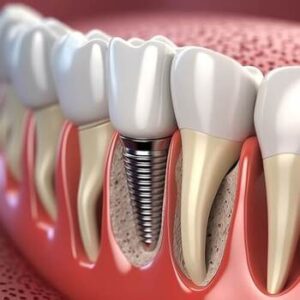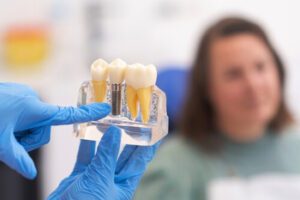The decision to opt for a dental implant is often overshadowed by the looming question: How much will it cost? Specifically, the “single tooth implant cost Australia” is a query many Australians grapple with when considering this dental procedure. Dental implants have revolutionised the way we address missing teeth, offering a long-term solution that’s closest in functionality and aesthetics to our natural teeth.
Dental implants, as innovative as they are, come at a price. And understanding the nuances of this cost can make your dental journey smoother and more predictable.
Dental Implants: A Brief Overview
Dental implants, a marvel of modern dentistry, have emerged as the foremost solution for replacing missing teeth. Let’s delve deeper into understanding what they are, how they work, and why they’re highly regarded in the dental world.
What are Dental Implants?
At its core, a dental implant is a tiny yet robust titanium screw. Why titanium? Its biocompatible nature ensures the body doesn’t reject it, enabling the implant to fuse seamlessly with the jaw bone in a procedure termed ‘osseointegration’. This screw then acts as a steadfast artificial root, laying the foundation for a crown or prosthetic tooth.
The Three Parts of a Dental Implant

Single Tooth Implant Cost Australia image
The Implant Itself (The Titanium Screw): This is anchored directly into the jaw bone. Over time, it integrates with the bone, creating a stable base for the replacement tooth.
The Abutment: As a bridge between the implant and the crown, the abutment is a small device attached to the implant post. It’s crucial because it holds the replacement tooth (or teeth) in place.
The Prosthetic Tooth (or Crown): Custom-made to match your natural teeth in colour and shape, this is the visible part of the dental implant. It’s made of durable materials, often porcelain, designed to withstand the biting forces while looking indistinguishable from your natural teeth.
Why are Dental Implants Preferred?
Several reasons contribute to the rising fame of dental implants:
Aesthetics: Dental implants are indistinguishable from natural teeth. They restore not just the tooth but one’s confidence to smile freely.
Functionality: Think of biting into an apple or savouring a juicy steak. Dental implants allow you to chew and enjoy food just like you would with your natural teeth. They restore near-normal functionality without the inconvenience of slipping, as dentures might.
Bone Health: When a tooth goes missing, the jaw bone underneath starts to deteriorate due to the lack of stimulation. Dental implants, embedded in the jaw bone, provide the necessary stimulation, promoting bone health and preventing bone loss.
Durability: With proper care, dental implants can last a lifetime. This longevity, combined with their functionality and appearance, makes them a cost-effective solution in the long run.
Preservation of Natural Teeth: Dental implants stand alone, unlike dental bridges, which might require grinding down adjacent teeth. This means surrounding natural teeth are left untouched, preserving their structural integrity.
The Evolution of Dental Implants
Dental implants aren’t new; ancient civilisations used various materials to replace missing teeth. However, the modern dental implant, rooted in scientific research and advancements in biocompatible materials, took shape in the mid-20th century.
Swedish orthopaedic surgeon Per-Ingvar Brånemark is often credited with discovering titanium’s ability to fuse with the bone. This realisation paved the way for the contemporary titanium-based dental implant procedure that we know today.
Factors Influencing Single Tooth Implant Cost in Australia
Embarking on the journey of getting a dental implant in Australia, particularly a single tooth implant, is no trivial matter. One primary concern for many is the associated cost. To navigate this landscape with clarity, it’s crucial to understand the myriad factors that play a role in determining the “single tooth implant cost in Australia”. Let’s dissect these components to provide a clear picture.
Complexity of the Procedure
Bone Grafting:
Before a dental implant can be placed, the jaw bone must be thick and strong enough to support the implant. If someone has had a missing tooth for a significant amount of time or has suffered from periodontal disease, they might experience bone loss.
In these cases, a bone graft might be necessary, which involves taking bone from another part of the body or using a special bone grafting material to encourage bone growth. This additional procedure can increase the overall cost.
Sinus Lift:
There might be insufficient bone height due to proximity to the sinus for implants in the upper jaw, especially the back areas. A sinus lift, or sinus augmentation, is a process to raise the sinus floor and create room for new bone, ensuring stable support for the implant. This, too, adds to the complexity and the cost.
Number and Skill of Dental Professionals Involved
Dental implants often involve the expertise of a dentist to place the implant and a dentist or dentist to design the crown or the replacement tooth. These professionals’ expertise, reputation, and experience can influence the cost. For instance, a renowned implant expert in a major metropolitan city might charge more than a general dentist in a regional area.
Implant Materials and Components
Dental implants aren’t one-size-fits-all. The choice of materials – from the titanium implant to the ceramic or porcelain crown – can differ in quality and brand. Premium brands, known for their advanced technology and high success rates, might command higher prices.
Geographic Location of the Clinic
Australia is vast, and dental costs aren’t uniform across its expanse. With higher overheads, clinics in major cities like Sydney or Melbourne might have different pricing structures than those in smaller towns or regional areas.
Dental Laboratory Costs
The crown or prosthetic tooth, custom-made to blend seamlessly with your natural teeth, is usually fashioned in a dental laboratory. The sophistication of the technology used, the quality of materials, and the expertise of the dental technicians play a part in determining these laboratory costs.
Additional Diagnostic Procedures
Before the dental implant procedure, diagnostic processes such as X-rays or CBCT (Cone Beam Computed Tomography) scans might be necessary. These imaging methods provide a detailed look at the jaw and the mouth, aiding in precise implant placement. The costs of these diagnostic tools are often factored into the total implant price.
Aftercare and Follow-up Visits
The dental implant surgery continues after the implant and crown placement. Follow-up visits to ensure proper healing, potential adjustments to the crown, and regular check-ups can also be components of the overall cost.

Single Tooth Implant Cost Australia illustration
Exact Costs of Single Tooth Implants in Australia: A Detailed Breakdown
Embarking on the pathway to dental implants comes with an understandable curiosity about the costs involved. After all, expenses can fluctuate depending on various factors in a country as vast and varied as Australia. Let’s dive headlong into a detailed analysis of the precise costs one might anticipate when considering a single tooth implant.
The Basic Cost: Implant, Abutment, and Crown
For many dental clinics, the baseline cost of a single tooth implant procedure can start from AUD 3,000. This pricing encapsulates the implant itself (the titanium post), the abutment (which bridges the implant and the crown), and the crown, which is the visible prosthetic tooth.
Preliminary Assessments and Consultations
Before the implant procedure commences, patients often undergo initial consultations and assessments. These sessions help determine the suitability for the implant and chalk out a tailored treatment plan. The costs for these preliminary evaluations can range from AUD 150.
Diagnostic Imaging
Detailed imaging, such as dental X-rays or more advanced CBCT scans, is essential for a comprehensive view of the dental structure, ensuring precise implant placement. The costs can vary, with basic X-rays costing around AUD 50, while CBCT scans can run from AUD 250.
Additional Surgical Procedures
As mentioned, not everyone will have the requisite bone health to support an implant immediately. Depending on the complexity, procedures like bone grafting can significantly increase dental implants’ cost, sometimes by an additional AUD 500. Similarly, a sinus lift, predominantly required for upper jaw implants, can add another AUD 2,000 to the overall cost.
Anaesthesia and Sedation
The comfort of the patient is paramount. Depending on the patient’s preference and the complexity of the procedure, different sedation methods might be employed for dental implants. Painful procedures like dental implant surgery often require Local anaesthesia that might cost AUD 100, while general anaesthesia or IV sedation can range from AUD 500.
Post-Operative Care and Maintenance
Once the dental implant is in place, the journey doesn’t conclude. Post-operative check-ups, potential adjustments, and maintenance all affect the overall expenditure. These follow-up visits can range from AUD 100 annually.
Geographic Variability
It bears repeating that Australia’s vastness contributes to the variability in costs. With higher operational costs, metropolitan areas might price their services more steeply than regional or suburban counterparts.
Warranty and Guarantees
Some clinics offer guarantees on their implants. While this can elevate the initial cost, it’s a testament to the quality of service provided and offers a safety net for patients. The premium for these guarantees can range from AUD 200, depending on the duration and terms of the warranty.
Why Opt for a Single Dental Implant?
Many wonder about the best course of action when faced with a missing tooth at the crossroads of dental decision-making. With various options available, from bridges to dentures, why would someone lean toward a single dental implant? Let’s delve into the compelling reasons that make single dental implants a prime choice for many Aussies.
Aesthetics and Natural Appearance
First and foremost, dental implants are often lauded for their uncanny resemblance to natural teeth. Designed to blend seamlessly with your existing dentition, a single dental implant can restore the functionality and aesthetics of your smile. No more shying away from photos or feeling self-conscious during social interactions!
Longevity and Durability
Unlike some other dental treatments, dental implants can last a lifetime when properly cared for. Dental implants provide a stable and enduring solution constructed from robust materials like biocompatible titanium, which fuses with the jaw bone. In the long run, this might mean fewer visits to the dentist for adjustments or replacements, leading to cost savings and less hassle.
Preservation of Jaw Bone Health
A unique benefit of dental implants is their ability to stimulate the jaw bone, akin to natural teeth roots. This stimulation prevents bone resorption, a common issue when a tooth is missing for an extended period. By opting for an implant, you’re not only filling a gap in your smile but ensuring the integrity of your jawbone remains uncompromised.
Maintenance of Adjacent Teeth
Other dental solutions, such as bridges, may require the adjacent teeth to be filed down or altered to anchor the replacement. In contrast, a single dental implant stands independently, ensuring that surrounding natural teeth are untouched and preserved in their original state.
Enhanced Functionality and Comfort
With a dental implant, there’s no sliding, clicking, or movement. It functions just like a natural tooth. Whether biting into a crisp apple or enjoying a hearty steak, the strength and stability of a dental implant ensure you can relish your meals without apprehension. Plus, given its stable nature, there’s no discomfort or the need for readjustments, as might be the case with dentures.
Oral Hygiene and Health
Maintaining impeccable oral hygiene with a dental implant is straightforward. There’s no need for special cleaning solutions or tools. Regular brushing, flossing, and dental check-ups are all that’s required. This simplicity promotes better oral health and reduces the risk of potential complications like gum disease or infections.
Cost-Effectiveness in the Long Haul
While the initial dental implant cost might seem steep, especially considering the “single tooth implant cost Australia”, it’s prudent to view it as a long-term investment. Given its durability, the likelihood of needing replacements or frequent adjustments is significantly reduced, potentially making it more cost-effective.
Conclusion
Navigating the landscape of a dental treatment can often feel overwhelming. But with the right guidance, expertise, and care, restoring your smile and ensuring optimal dental health becomes a journey of empowerment and confidence. A single dental implant offers myriad benefits that resonate with aesthetic aspirations and functional necessities.
At Balmoral Dental Centre, we are committed to guiding you every step of the way, ensuring a transparent, comfortable, and fulfilling experience. Our dedicated team of professionals is equipped with the latest knowledge, technology, and compassion to bring you the best dental solutions tailored to your unique needs.
Ready to embark on this transformative journey and discover the best dental solutions for you? Give us a call at (07) 3113 9789. Your radiant, confident smile is just a phone call away.

